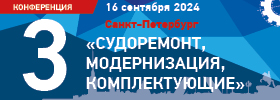IBIA Chairman Nigel Draffin: “The bunker fleet worldwide is improving in quality”
One of the world’s strongest unions of the bunkering market players is the International Bunker Industry Association (IBIA). The Association comprises over 600 ship owners, bunker fuel suppliers, brokers, barging and other service companies from 66 countries. Mr. Nigel Draffin, Chairman of the Association, combining this post with the duties of a Technical Director of LQM Petroleum Services, answered the questions of PortNews IAA about the sector development and the challenges of the Association.
- Mr. Draffin, what are the trends of the bunkering market development?
- The bunker market responds to supply and demand drivers and, especially the demand is becoming increasingly driven by regulation and legislation. Buyers have to demonstrate compliance to port authorities and flag states; this in turn shapes their demand for compliant fuel. At the moment the most significant influence is regulations on sulphur content.
- How do you estimate the prospects of LNG bunkering development especially in the Baltic Sea? Is there a proper infrastructure in European ports? Is it sufficient and will they succeed in its development by 2015?
- LNG as a storage medium for methane for non LNG tankers is a growing alternative to low sulphur liquid fuels. At present, until the IMO has concluded the International Gas Fuelled ship code (IGF code) utilization is restricted to national waters or trade between nation states whose national waters are contiguous. For this reason the majority of LNG fuel storage is limited to Norway, Sweden and Finland however I expect to see more participation from other Baltic states over the next 1 to 2 years. The infrastructure will develop as the demand increases and many short sea routes will become practicable during 2015.
- Do you notice any tendency towards consolidation of the bunkering market players at local markets where the members of your Association work?
- Consolidation is a feature of the difficult financial situation and as cash flow and credit come under more pressure I expect it will continue.
- Is there a deficit of the bunkering fleet meeting MARPOL requirements? How and when can it be covered?
- Generally. The bunker fleet worldwide is improving in quality with a large proportion of modern double hull barges but there are areas where the local industry still has to find the money and the will to invest in modern tonnage. I would not wish to single out particular locations, they know who they are. There are also locations where the local suppliers are unable or unwilling to meet the requirements of MARPOL Annex VI, this causes difficulties for our members sourcing fuel for their ships in those places and we are keen to see this problem resolved.
- Will the price trend change in the European bunkering market in 2013?
- Prices in 2013 will be driven, as before, by the worldwide oil markets. I do not expect to see this change until 2015 and the new ECA sulphur limit.
- What results in solution of bunkering community’s problems did your Association achieve in 2012?
IBIA was active within the committees of IMO and in liaison with the European Commission on a number of issues related to bunkering. We also interact with other trade bodies such as INTERTANKO (International Association of Independent Tanker Owners) and SIGTTO (The Society of Gas Tanker and Terminal Operators). We are active in promoting and delivering industry training initiatives both for our members and on behalf of some port regulators. We are not a traditional trade association in that we represent every sector of the industry – Buyers and Sellers, Deliverers and Port Authorities, Suppliers and Analysis companies – Every part of the bunkering chain.
- Are you ready to cooperate with the Russian Association of Marine and River Bunker Suppliers?
- In my year chairman I have not received any approaches from the Russian Association , but we would be very happy to co-operate with them for the good of the bunker industry as a whole. We always welcome cooperation with other likeminded organizations which can assist in improving the safe, effective and economic supply of bunker fuel to ships. We have long enjoyed fruitful links with similar bodies including, for example, the Turkish Bunker Association. We also have branches in Singapore and Southern Africa supporting our members in South East Asia and Sub Saharan Africa respectively: perhaps it is time for us to look at the Russia?
Elena Snitko





